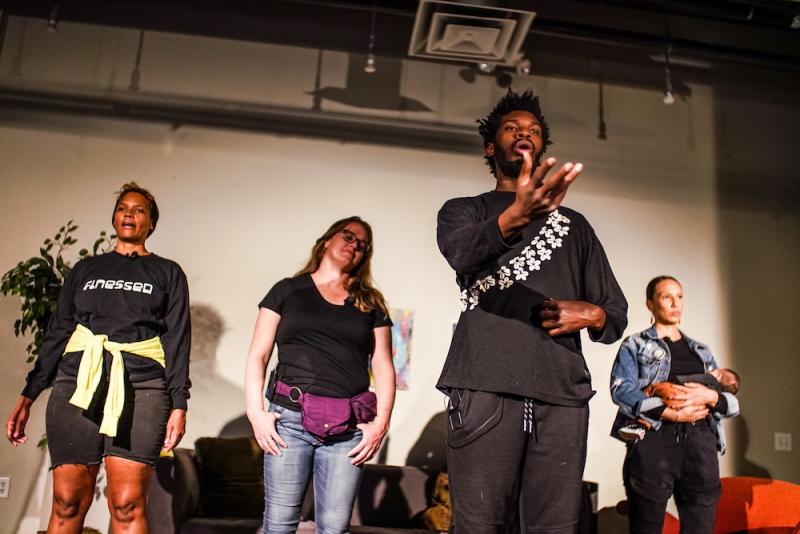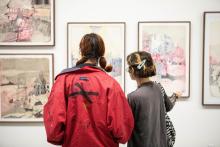ARP Grant Spotlight: Creative Strategies for Change (Denver, CO)

Justy Robinson and the cast of Reckoning opening the space for a hybrid performance event. Photo courtesy of Creative Strategies for Change
At one time, one of the best places to hear live jazz was along Welton Street in Denver, where Duke Ellington and Ella Fitzgerald were among the marquee legends who traveled to perform. A vibrant social scene dotted the predominantly African-American neighborhood of Five Points for decades, making it a destination that some called the “Harlem of the West.”
For much of the 1920s to 1950s, the neighborhood provided a haven for Black residents, who gravitated to areas where housing discrimination was less prevalent and segregation less visible. But much like the urban centers of other cities, Five Points began declining in the 1960s and ’70s and has yet to return to its robust past.
Today, a new group of creative thinkers is working to recognize the cultural past and look toward a more thoughtful and inclusive future through arts and social justice education.
Creative Strategies for Change (CSC) was founded in 2012 with the goal of helping communities increase education, dialogue, training, and organizing for social justice and racial equity through programs that include culturally specific arts such as hip hop, African dance, drumming, and protest art. CSC hopes to be an organization that can build bridges and engage communities on all sides of a conversation or issue.
In January, Creative Strategies for Change was awarded its first NEA grant with funding made possible by the American Rescue Plan. Fifty percent of the funds were allocated to support artists in their own community, many of whom are artists of color.
Operating out of Five Points, CSC partners with the community to provide organizational consulting, performance, and youth programs through an artistic lens.
“We recognize the intersectionality of all our lives and CSC doesn’t exist within one bucket. We are using arts education to create a brave space for people to learn about social justice, and to have those challenging conversations,” said CSC co-founder Rachael Sharp.
Not only is CSC’s goal to create an open space for program participants to learn, but also to use their CSC 3 model to inform social change for a long-lasting impact. This model contains three pillars: social justice frameworks that support trainings in diversity, inclusivity and cultural awareness; arts engagement that empowers the senses and inspires freedom of expression and communication; and restorative practices that promote individual and collective community health through conflict resolution strategies.
This model is pervasive through all of their programming, and even during the pandemic, the organization made its programming accessible to all by continuing to offer workshops for free or on a sliding scale for attendees. CSC is also a community partner with Denver Public Schools and has facilitated enrichment opportunities with hundreds of students across the school district.
“Before the pandemic, we were working with five schools in the Denver area, and overnight we found ourselves with a big question mark hanging overhead. But we never once paused programming, and we pivoted to start serving young people directly in the community and virtually,” said Bianca Mikahn, co-director of Arts and Education.
While the CSC team was able to continue their work during the pandemic, the abrupt transition to a Zoom room left the artists and students wanting for human connection.
“It was really challenging to have a disruption in the middle of a six-week course and for it just to cut off with no opportunity to say, ‘Hey, how do we hold each other through this?’ We lost income, but we also lost relationships, and I think that was the hardest part,” said Sharp.
This forced transition also sparked new ideas and adjustments to help community members process the pandemic and ongoing racial tensions. CSC shifted from all in-person events to, two years later, still hosting 70-80 percent of their events virtually. Mikahan started sharing online content around mental health on “Mental Health Monday,” and launched a Social Imagination performance event entitled “Reckoning: An Examination of Race and Rona.”
“We have really focused on mental health and racial justice and looking at the intersection of those dynamics and how they've affected our community of artists, educators, and activists. The show was a really powerful space. People were like, ‘Okay, it's not therapy, but is it?’ It feels like theater therapy,” said Sharp.
Both Sharp and Mikahan are impressed at how well program participants are able to connect despite not being in the same physical room.
“The fact that I can get a similar type of goosebumps from a deep thing that someone shares miles away really speaks to the work. We can do this from anywhere,” said Mikahan.





